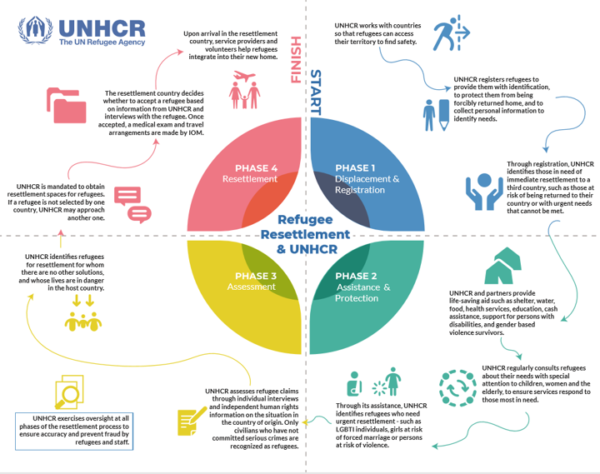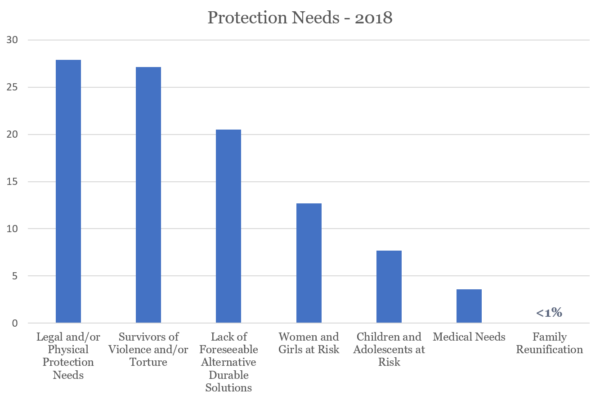Find out more about the process refugees go through before arriving in the UK
When the family you support arrive in the UK, they will be beginning a new chapter in their lives. But to get to this point, the family will have been going through a process to be resettled for years. In this page, we will give you an idea of the behind-the-scenes process that is involved in selecting and resettling refugee families to the UK.
What do we mean by “refugee”?
We like to remind Community Sponsorship Groups that “refugee” is just an immigration status. When you meet the family, they will no longer be “the refugees” but “the so-and-so family”. However, being defined or not defined as a refugee in the global legal landscape will have an impact on a person’s access to services and protection, so it’s important to understand the meaning behind this term.
The UK Government, along with most other resettlement countries, defines the term refugee according to the 1951 Convention as someone who: ‘owing to a well-founded fear of being persecuted for reasons of race, religion, nationality, membership of a particular social group, or political opinion, is outside the country of his nationality, and is unable to or, owing to such fear, is unwilling to avail himself of the protection of that country’ (Article 1, 1951 Convention Relating to the Status of Refugees). To obtain refugee status, someone must prove that they cannot return to their country based on one or more of the above five grounds. This means that if someone leaves their country and cannot return due to economic, environmental reasons, or even generalised violence, the UK government would not consider this person to be a refugee.
The refugees supported by Community Sponsorship Groups are refugees that have been given this status by the United Nations High Commissioner for Refugees (UNHCR) in a host country – so not in their home country, nor in the UK – and do not have access to any other durable solutions other than resettlement. This means that these families cannot return to their home country and they cannot integrate into their host country, so they are left with no option but to be resettled to a third country for their protection.
The UK Resettlement Scheme (UKRS)
In March 2021, the UK Government announced the launch of a new resettlement scheme UK Resettlement Scheme (UKRS). Through this scheme, all refugees who arrive through Community Sponsorship will not be included in the targets or pledges made by local authorities. Find our more about the UKRS scheme here.
The refugee journey
Every refugee who is resettled to the UK is a person with a unique experience that forced them to leave their country and never return. The family you support through Community Sponsorship may never disclose this story to you. However, for the sake of understanding the refugee experience, we can look at an example family that may have a similar experience to many refugees who fled Syria in the beginning of the conflict:
In 2012, this family is living in Homs, Syria. Protests have been going on in their neighbourhood for some time but in the beginning of 2012, they begin to see masked, armed men roaming their area who they presume are members of the armed opposition. As a result of the presence of these armed opposition groups, the Syrian government begins indiscriminately shelling their civilian-populated neighbourhood.
Faced with the choice of staying in their home and risking their lives or fleeing the area, the family decides to stay with family in another area. Over the course of a year, the security situation in the country becomes worse, their children aren’t going to school and perhaps their young son is nearing the age of forced military conscription, so the family decides to cross the border into Jordan.
When they arrive in Jordan, the family is escorted to a refugee camp where they register with UNHCR. After a few weeks in the camp, the family decides to move to the capital, Amman, where they can move freely and work. They rent a flat in Amman but over the course of five years, life becomes more and more difficult. Perhaps they are unable to find work and are threatened with homelessness, or the authorities have threatened to deport them if they work without a permit, or maybe one of their children has been diagnosed with a serious illness that cannot be treated in Jordan. For one of these hypothetical reasons, the family cannot stay in Jordan, nor can they return to Syria, so UNHCR selects their “case” to be assessed for resettlement.
The resettlement process

How are refugees selected and assessed for resettlement?
The UK Government relies on UNHCR to help them identify and process vulnerable refugees who would benefit from resettlement. UNHCR has responsibility for all out-of-country casework activity relating to UKRS.
They will:
- verify identity and family composition;
- interview registered refugees to determine their experiences and current circumstances in the host country;
- identify refugees with potential resettlement needs and assess their vulnerability;
- conduct a full Refugee Status Determination (RSD); and
- conduct a resettlement interview and assess that refugees meet the criteria for resettlement in accordance with UNHCR’s resettlement handbook before referring them to the UK for consideration.
UNHCR will conduct interviews with the family as they are mandated to determine whether an individual meets the 1951 Convention definition of a refugee and are best placed to assess their protection needs. Having determined that the individual is a refugee UNHCR will then consider whether resettlement is the right long-term solution for them, and then to which country or resettlement scheme they should be referred. Refugees do not decide which country they are referred to, rather UNHCR looks at available quotas and decides which country criteria the family best fits.
Refugees are assessed for resettlement by UNHCR against their resettlement submission categories shown in the graph below:

UNHCR estimates that the current need for resettlement worldwide is 1.44 million, however, in 2019 only 63,696 were resettled to third countries. Given that there are an estimated 26 million refugees in the world, less than 1% will ever be considered for resettlement.
Referral to a resettlement country
If UNHCR consider that an individual should be referred to the UK for resettlement, they will send a Resettlement Referral Form (RRF) which confirms that the individual has been determined by UNHCR to be a refugee according to the terms of the 1951 Convention. The RRF includes confidential information about each family member and may include information that a husband or wife doesn’t know about their spouse, as all adults are interviewed separately. The RRF is processed by the Home Office casework team, who determine whether the case should be accepted for resettlement to the UK.
The Home Office also take security extremely seriously in cases referred to the UK for resettlement. UNHCR screens out cases for resettlement consideration in accordance with the safeguards built into the 1951 Refugee Convention. When potential cases are submitted by UNHCR for consideration they are screened and considered for suitability for entry to the UK; the Home Office retains the right to reject individuals on security or other grounds.
Preparing for departure
After the family is accepted and agree to be resettled to the UK, they will undergo medical checks and three days of cultural orientation classes with the International Organisation for Migration (IOM).
Once the Home Office allocates the family to your Group, and you and the Local Authority accepts the allocation, exit procedures from the host country will begin and flights will be booked. The family will have about six to eight weeks from learning they will come to your community to flying to the UK, where you will pick them up from the airport!
